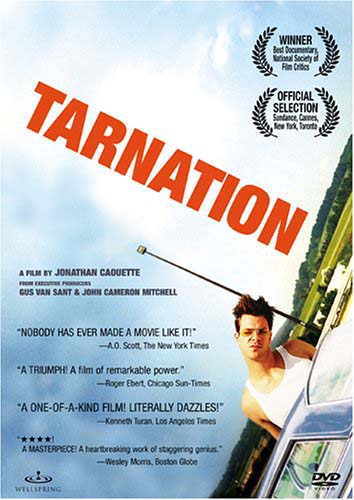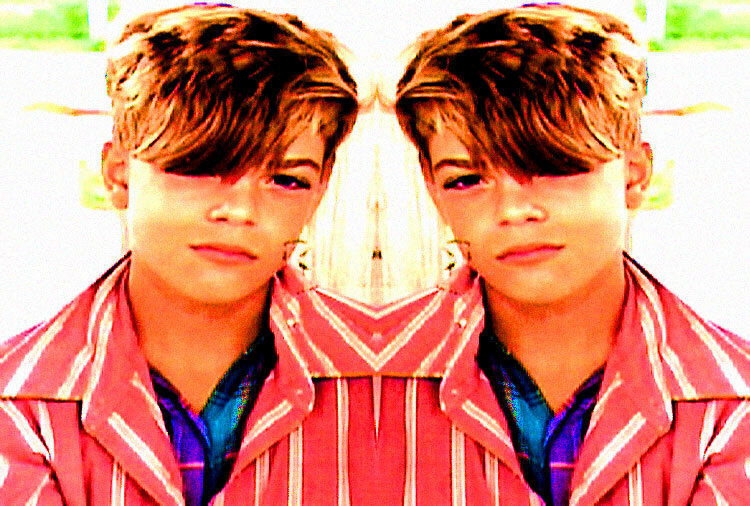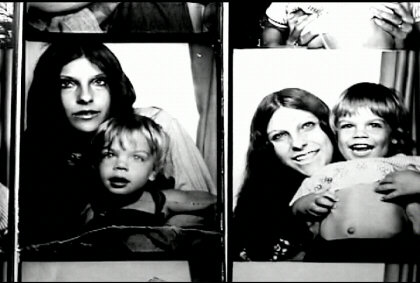País: USA.
Año: 2003.
Duración: 88 min.
Género: Documental.
Intervención: Jonathan Caouette, Renée Leblanc, David Sanin Paz, Rosemary Davis, Adolph Davis.
Producción: Stephen Winter.
Producción ejecutiva: Gus Van Sant y John Cameron Mitchell.
Música: Jonathan Caouette.
Fotografía: Jonathan Caouette.
Montaje: Jonathan Caouette y Brian A. Kates.
LA PRIMERA PREGUNTA QUE SURGE EN MI MENTE:
¿Qué rayos es Tarnation?
Según Wikipedia: colloquial euphemism for damnation, primarily used in the southeastern United States, part of the expression "What in tarnation?" used to indicate disbelief.
Importante entender el título. La relación con el film es evidente.

Jonathan Caouette. Checando su blog. Una de sus tres películas favoritas es Tarnation. (las otras dos son Rosemary's Baby y Village of the Damned.) En realidad no me sorprende una prueba más de su narcisismo, simplemente me parece de mal gusto publicarlo en un blog de manera tan descarada, aunque supongo que después de haber realizado una película entera sobre él mismo, esto no resulta tan egocéntrico.


Un poco sobre la película:
$218.32 plus dozens of hours of work on his home computer totally changed Jonathan Caouette’s world. At the age of 11, Caouette borrowed a video camera from a neighbor and began filming his family as a way of validating and coping with his daily life. Almost two decades later, Jonathan Caouette took his 160+ hours of footage and with a total budget of only $218.32 created “Tarnation,” a true independent film in every sense of the word.
“Tarnation” chronicles Jonathan’s chaotic upbringing, focusing on his relationship with his mentally-ill mother, Renee. Caouette’s documentary-style film mixes pop culture references with footage shot over the course of 20 years to create an incredibly touching story of a dysfunctional family and the undying love that binds a mother and son.

Una entrevista:
How much of a struggle was it for you to decide to put your life on display with this film?
I have to say that it’s been an emotional roller coaster. It really has, and it still is. I mean, it would be a very hypocritical statement if I said, “Oh, everything’s fine. It was cathartic and now I’m ready to move on.” It’s still crazy. It still wakes me up in the middle of the night with butterflies in my stomach, sort of pondering what it is that I’ve actually done here.
I think, ultimately, it’s a beautiful thing. I think it’s a very poignant story that needed to get out there. Between my mother and I, we always knew that we had a really, just sort of vital, urgent story that had to get out there. I just never realized it was going to be by way of the real McCoy footage that was kind of hovering under my nose the whole time.
It’s been a beautiful thing. It’s been a nice calling card, too, career-wise. I’m sort of an out-of-nowhere filmmaker. The film has been embraced by such amazing people and of course endorsed with the names of [executive producer] Gus Van Sant and [executive producer] John Cameron Mitchell. But it’s been very, very daunting. I’m a newbie neophyte in all of this. I was a doorman before all this happened (laughing). Anything that was ever going to happen like this in this world of how this film was catapulted to where it is, it was always on a sort of delusional level. It was never actualized. At best, if the film was ever made, or if anything I was going to do utilizing this footage was ever made, at best I thought it would be on a video projector somewhere in a hole in the wall in Williamsburg, Brooklyn. But I never in a million, trillion years anticipated this sort of response – ever. It’s just an amazing thing.

Will the success and critical acclaim that came with “Tarnation” be a tough thing to live up to with your second film? Where do you go from here?
Oh yeah, there are so many things I want to do. There’s actually a few possibilities in the works of doing one and/or two remakes of two very intensely popular rock musicals from the 70s that were plays and then turned into films. It’s that time again to revisit the stories for an updated version, perhaps, which would be cool.
I definitely want to dabble in all kinds of genres of film. I don’t want to sell out too quickly. I don’t want to succumb to the Hollywood system. As a matter of fact, I would really love to sort of remain in the D.I.Y. world of things and still just stay on my computer and try and do a few things.
One of the other things that I was wanting to do, which will probably, inevitably, realistically be my next project is I’m taking three films that were all made in succession between the years of 1973 and 1977 and they all star this one actress, who actually assumes the same aesthetic throughout all of the films - even right down to her hair length and accent. And my fantasy is to basically get all three of these films free of underscore and free of music, and re-augment them and re-mix them into a new two hour film that’s going to evoke a completely different story. Inadvertently talking to David Lynch’s producer about it out at the Cannes Film Festival, I said, “This is sort of like a one day thing I want to do to get back to the MIX Film Festival for kick-starting ‘Tarnation.’ Like an under the gun, off the record, no distribution rights inferred, like a 'Superstar: The Karen Carpenter Story' kind of thing.” And he got so excited about it that he actually wants to come on as producer.
Are you kicking yourself for talking about what might be your next project? Doesn’t that add some pressure?
No, I’m happy that it happened. When I went to th e Cannes Film Festival, I knew that that was going to be the place where people would be like, “What’s next? What’s next? What’s next…?” So I started fantasizing about talking about something, or pretending to talk about something that actually, the more I thought about, the more of a reality it became. It started off as a way to kind of coax people with the idea that I had something else to do, but now it’s really become a reality. And the other thing I want to do is, believe it or not, a sequel or an equal to “Tarnation,” which I’m going to be doing in the next year. It’s going to be called “Buddy.” I don’t want to give it away, what it’s about. All I can say is that it’s going to be creatively utilizing the rest of the 160 hours of footage that I’ve acquired from my life and augmenting it into something really unexpected.
e Cannes Film Festival, I knew that that was going to be the place where people would be like, “What’s next? What’s next? What’s next…?” So I started fantasizing about talking about something, or pretending to talk about something that actually, the more I thought about, the more of a reality it became. It started off as a way to kind of coax people with the idea that I had something else to do, but now it’s really become a reality. And the other thing I want to do is, believe it or not, a sequel or an equal to “Tarnation,” which I’m going to be doing in the next year. It’s going to be called “Buddy.” I don’t want to give it away, what it’s about. All I can say is that it’s going to be creatively utilizing the rest of the 160 hours of footage that I’ve acquired from my life and augmenting it into something really unexpected.
When you originally cut “Tarnation” it was 2 ½ hours and you got it down to 88 minutes?
I got it down to 88 minutes. The reason it was 2 ½ hours was that I sort of maniacally put it together. The reason I did it so quickly, I did it in like three weeks, I met an intern from the MIX Film Festival who said, “Well, whatever this is that you are working on…” I sort of accidentally showed it to him and he said, “Whatever this is that you are working on, you should finish it because there’s a deadline for our film festival coming up in the next three weeks.” That’s when I went on this sort of editing rampage and got it down to my 2 ½ hour cut, which was a much different film at the time. The stipulation for showing it at MIX was that they couldn’t show a 2 ½ hour cut, so I cut it down to 2 hours. Then after that they wanted it at 88 minutes for Sundance. That’s when I had to revisit everything and crunch everything down. I inevitably changed the ending, which was more of an art imitating life type of thing.

Was it more difficult to get it to the 2 ½ hour original cut or down to the final 88 minute cut?
Definitely the most challenging aspect about piecing this film together was crunching it down to the 88 minutes because there’s so much that was left out. There could be conceivably three different films that were left out. I think, ultimately, that’s why I ended up cutting it out. There would be other subject matter and subplots that did exist that I realized at the end would be much more appropriate for an additional film, perhaps one day.
A lot of kids pick up video cameras but not everyone chronicles this much of their life.
I know.
Did you have any inkling as a kid that someday this is what you were going to be doing with your life?
Always. Always. (Laughing) I can even get you the number to my first camp counselor. He’s known me since I was 5 years old and all I used to talk about was wanting to be a filmmaker. It’s been in my blood. I always had a love for film and knew I always wanted to be a filmmaker. I would go to movie theaters with my grandfather in the pre-VCR days and with a tape recorder, I would record all the audio. I was really fascinated, even down to everything like the sound pops and the reel changes, every aspect of it. After the movie we would go to our local drugstore and I would pick up about four or five stacks of typing paper or loose drawing paper. I would, with markers, I would go through and draw the movies frame by frame, basically. Or at least every other millisecond of the movie, to the audio of the movie I would record when I went to the theater with my grandfather. So it’s always been there – somehow, someway.
You used your camera to get to the truth about your life and your family. I’m wondering if you could have just put the camera down and talked to let’s say your grandfather, or did everything always have to be through the camera to distance yourself?
It would depend a lot on the subject matter. I was always using the camera as some sort of quasi-defense mechanism or a weapon of some kind to ultimately make sense of everything, just a lot of the stuff that I was being subjected to. And it was just a way to validate things. It was more of a confirmation. “Is this really happening? Pinch me if this is really happening.” Or, “This is so spooky and I’m alone in this situation. If I document it maybe I can look back on it and piece things together.” Because you know documenting things sometimes can enable you to hold onto memories, which I’m really into. I love the idea of holding onto moments.

FUENTES:
- Tarnation Movie. Jonathan Caouette. http://movies.about.com/od/directorinterviews/a/tarnation101504.htm




No hay comentarios:
Publicar un comentario